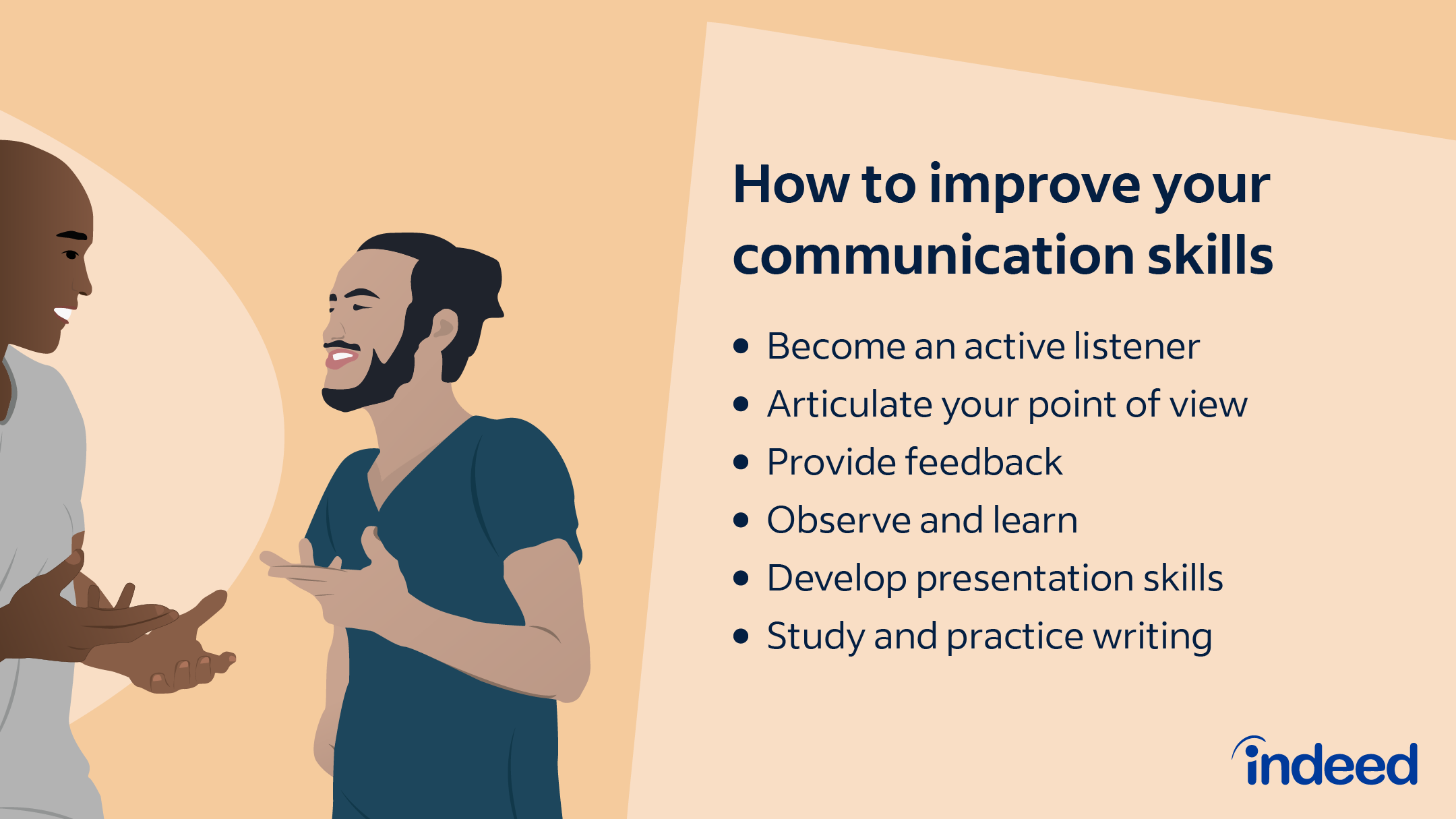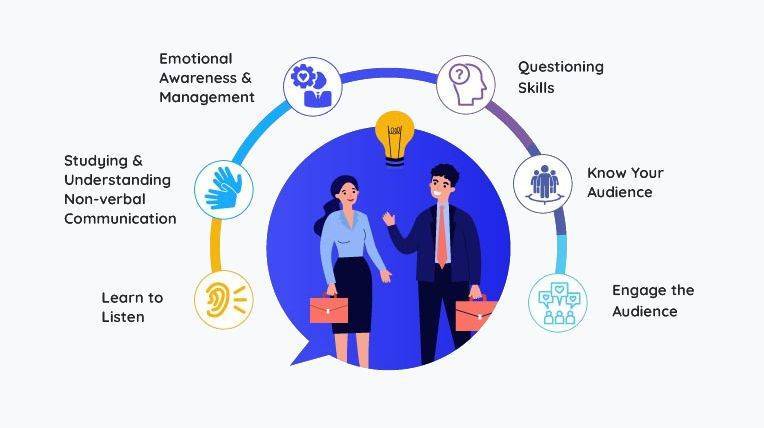Mastering Communication Skills: How to Improve Your Ability to Connect

Effective communication skills are essential in every aspect of life, from personal relationships to professional success. Whether you’re delivering a presentation at work, engaging in casual conversation, or negotiating a business deal, how well you communicate can significantly influence the outcome.
Improving your communication skills is a powerful way to increase your self-confidence, enhance relationships, and boost your career. This guide will explore actionable strategies for honing both your verbal and non-verbal communication skills, help you understand the barriers to effective communication, and provide tips for becoming a more persuasive communicator.
Why Communication Skills Matter
Good communication is more than just exchanging information; it’s about understanding the emotions and intentions behind the message. Whether you are talking to a colleague, a friend, or an audience, effective communication can help you:
- Build stronger relationships
- Resolve conflicts with ease
- Achieve career success
- Increase your confidence
- Improve your personal growth
The ability to communicate clearly and empathetically is crucial for fostering cooperation, trust, and collaboration. On the other hand, poor communication can lead to misunderstandings, frustration, and even missed opportunities.
Key Aspects of Effective Communication
To be an effective communicator, it’s essential to work on the following aspects of communication:
1. Verbal Communication
Your choice of words and how you say them directly affect the clarity and impact of your message. Here are a few tips to improve your verbal communication:
- Use clear and concise language: Avoid jargon and overly complex terms. Your message should be simple and to the point.
- Be mindful of your tone: The tone of your voice can significantly change the meaning of your words. Ensure your tone is appropriate for the situation.
- Practice active listening: Pay close attention when others speak. Show interest through verbal cues like “I see,” “That’s interesting,” or “Tell me more.”
Effective verbal communication also involves being open and transparent. Share your thoughts clearly, but also leave room for others to contribute to the conversation.

2. Non-Verbal Communication
Non-verbal cues, such as body language, gestures, facial expressions, and eye contact, make up a significant portion of communication. Mastering non-verbal communication can help reinforce your message and build rapport with others.
Here are a few non-verbal tips:
- Maintain good posture: Stand or sit up straight to convey confidence.
- Use eye contact: Maintain eye contact during conversations to show attentiveness and interest.
- Pay attention to facial expressions: Ensure your facial expressions align with the message you’re trying to communicate.
Non-verbal communication can often say more than words alone, so it’s essential to be aware of these signals when speaking with others.
3. Empathy and Emotional Intelligence
Being empathetic means understanding and acknowledging others’ feelings and perspectives. Emotional intelligence (EI) is the ability to manage your emotions and understand those of others. Both are crucial for effective communication.
- Practice active listening: Don’t just hear words; understand emotions behind them.
- Respond with empathy: Acknowledge the speaker’s feelings and show you care.
When you understand the emotions involved in a conversation, you’re more likely to respond appropriately, building trust and reducing the chances of misunderstandings.
4. Feedback and Adaptability
Providing and receiving feedback is essential for effective communication. It allows you to learn and grow from interactions. Here’s how to do it right:
- Give constructive feedback: Be specific, respectful, and focused on actions, not personal traits.
- Receive feedback gracefully: Accept criticism with an open mind, asking for clarification if necessary.
- Adapt your communication style: Not everyone communicates the same way. Pay attention to how others prefer to communicate and adjust accordingly.
Effective feedback can strengthen relationships and help everyone involved learn and improve.
Common Barriers to Effective Communication
While working on communication skills, it’s important to understand the barriers that can hinder effective exchange:
1. Language Barriers
Differences in language or terminology can often lead to misunderstandings. Avoid jargon, and make sure your language is accessible to all parties involved.
2. Cultural Differences
Cultural backgrounds influence communication styles. Being aware of cultural differences, such as different expressions of respect or body language, can help you avoid miscommunication in diverse settings.
3. Lack of Focus or Distractions
Distractions, whether physical (like a noisy environment) or mental (such as multitasking), can affect your ability to listen or convey your message clearly.
4. Assumptions
Assumptions lead to misunderstandings. It’s important to ask questions and seek clarity rather than jumping to conclusions.
5. Emotional Barriers
If emotions like anger, stress, or anxiety are involved, they can cloud the communication process. Learn to manage your emotions effectively to communicate clearly and calmly.
Actionable Tips for Improving Communication Skills
Improving your communication is an ongoing process. Here are some practical steps you can take today to improve your communication skills:
1. Practice Active Listening
Active listening is a fundamental communication skill. It involves fully focusing on the speaker, understanding their message, responding thoughtfully, and remembering key points. Here are some techniques to improve listening:
- Avoid interrupting: Let the speaker finish before responding.
- Ask clarifying questions: Ensure understanding by asking questions like “Can you elaborate on that?” or “What do you mean by that?”
- Summarize: Paraphrase what the speaker said to ensure clarity, like “So what you’re saying is…”
2. Engage in Role-Playing or Simulations
Role-playing exercises or simulations can help you practice your communication skills in different scenarios. Whether you’re preparing for a job interview or a difficult conversation, practicing with a friend or mentor can help you feel more confident.
3. Read Books on Communication
Reading about communication techniques can provide deeper insights into how to improve your skills. Books like “How to Win Friends and Influence People” by Dale Carnegie or “Crucial Conversations” by Kerry Patterson offer expert advice on becoming a better communicator.

4. Take Communication Courses or Workshops
Participating in formal courses can help you learn new strategies and techniques for effective communication. Whether online or in-person, workshops provide practical knowledge and hands-on experience in mastering communication.
FAQs on Communication Skills
What are the key elements of effective communication?
Effective communication involves clear verbal and non-verbal expression, active listening, emotional intelligence, and the ability to provide and receive feedback.
How can I improve my verbal communication?
To improve verbal communication, focus on being clear, concise, and thoughtful in your speech. Avoid jargon, use an appropriate tone, and be mindful of how you articulate your words.
Why is non-verbal communication important?
Non-verbal communication, such as body language and facial expressions, helps convey emotions and adds depth to the message being communicated. It can reinforce or contradict what is being said verbally.
How do I overcome communication barriers?
To overcome communication barriers, ensure you’re clear and concise in your message, avoid assumptions, and be mindful of cultural differences. Practice active listening and seek feedback from others.
Conclusion
Improving your communication skills is not a one-time task but an ongoing process. By practicing active listening, refining your verbal and non-verbal communication, and being open to feedback, you can become a more effective communicator in both your personal and professional life.
Remember, good communication is essential for building relationships, achieving your goals, and managing conflicts. So take the time to hone these skills, and you’ll undoubtedly see improvements in your interactions and outcomes.
By mastering communication skills, you can unlock new opportunities and create stronger connections in all areas of your life. Keep learning, stay curious, and watch as your ability to communicate transforms the way you connect with others.

